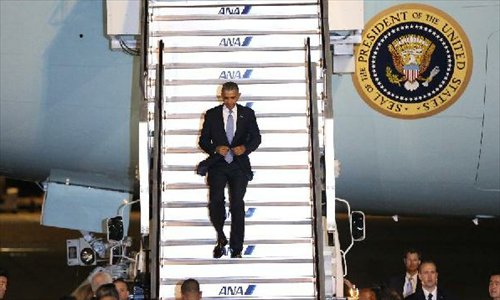Japan reassured over Diaoyu

US President Barack Obama steps from the Air Force One as he arrives in Tokyo, Japan on April 23, 2014. Obama began a four-country trip through the Asia-Pacific region on Wednesday. Photo: Xinhua
US President Barack Obama started his four-nation Asia tour on Wednesday by overtly supporting Japan over its disputed territory with China, which experts say will exacerbate the already tense situation in East Asia.
In a written interview with The Yomiuri Shimbun published on Wednesday, Obama stated that the Diaoyu Islands in the East China Sea fall under Article 5 of the Japan-US Security Treaty, which obliges the US to protect Japan if there are conflicts over Japan-administered territories. He also supported moves by Japan to ease self-defense limits in his remarks.
"We oppose any unilateral attempts to undermine Japan's administration of these islands," Obama said, adding that the US engagement with China "does not and will not come at the expense of Japan or any other ally."
While Japanese Prime Minister Shinzo Abe has been seeking to ease the restrictions on its collective self-defense rights prohibited by Japan's Pacifist Constitution, Obama welcomed Japan playing a greater role in international security.
"I commend Prime Minister Abe for his efforts to strengthen Japan's defense forces and to deepen the coordination between our militaries, including by reviewing existing limits on the exercise of collective self-defense," Obama said, requesting Japan's Self-Defense Forces "do more within the framework of our alliance."
This is the first time that an incumbent US president has made such open remarks in support of Japan.
"Abe, more than any of his predecessors, has made headway on what Washington has long wanted from Japan, to become a more assertive partner in regional security," Jeff Kingston, director of Asian Studies at Temple University Japan Campus, told the Global Times.
Obama, who is making the first full state visit to Japan by a US President since 1996, is expected to assuage worries by Tokyo and other allies regarding his commitment to their defense, without hurting vital US ties with Asia's biggest economy - China.
Such assurances are likely to be high on the agenda when Obama meets Abe at a symbolic summit on Thursday.
"If Obama intends to improve relations with China, he is likely to antagonize the ally. To the extent that he improves relations with the allies, he'll antagonize Beijing," Kingston said, adding that Obama is on a "mission impossible."
"Obama wants a better relationship with Beijing, but he thinks that Beijing also needs to think about modifying its behavior," Kingston noted.
Shi Yinhong, director of the Center on American Studies at the Renmin University of China, said the remarks are intended to warn China while reassuring Japan and other US allies of its security guarantee, which has been under suspicion due to the way the US has dealt with the Ukraine issue.
"Japan will be very satisfied this time. But this will encourage Tokyo to step up its confrontation with Beijing," Shi told the Global Times, adding that it will further strain tensions in Asia and even damage Sino-US relations.
Japan has ramped up its military surveillance capabilities on its westernmost island of Yonaguni, which is close to the Diaoyu Islands, by starting construction of a radar unit on Saturday.
Reiterating that the Diaoyu Islands are an inherent part of China's territory, China's foreign ministry spokesperson Qin Gang said China is strongly opposed that the islands being part of the security treaty, which was reached during the Cold War and should not damage China's sovereignty and rightful interests.
Obama and Abe are also keen to show progress on a two-way trade pact. This is seen as critical to a broader regional deal that would be one of the world's biggest trade agreements and is central to Obama's "pivot" towards Asia.
Agencies contributed to this story